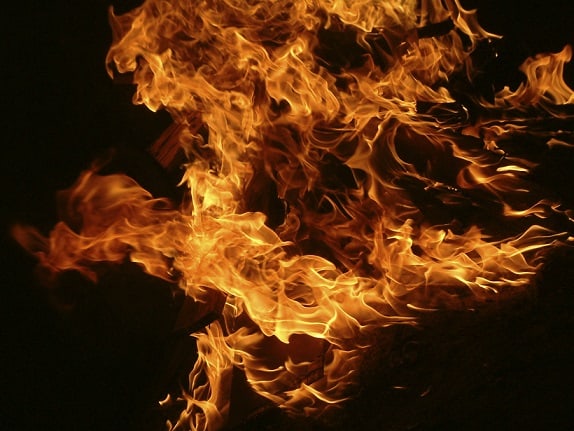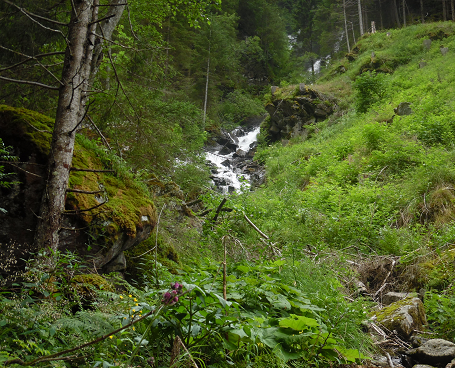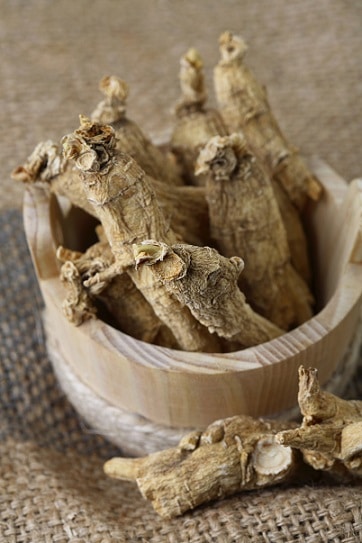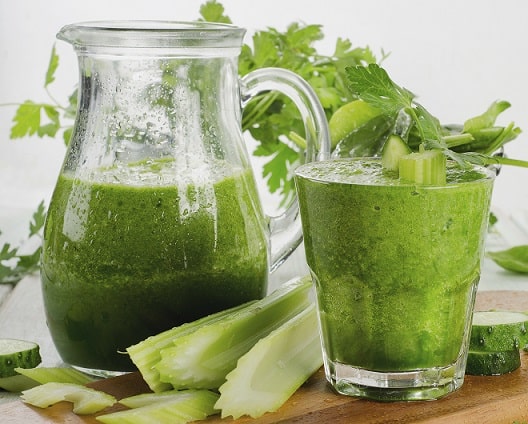Korean ginseng is one of the most famous herbal supplements of all time. Traditional Chinese medicine has recommended this herb for thousands of years, and right now, men and women everywhere are falling for the craze after reading glossy magazine articles and raving amazon reviews.
In 2010 alone, over 80,000 tons of ginseng were produced in Canada, South Korea, China and the US of A. Global sales of ginseng root now exceed two billion dollars annually.
There’s multiple varieties, including American ginseng, Siberian ginseng, and of course, the fraudulent imitation variety. The one we’re mainly concerned with is the original Panax ginseng, AKA Korean ginseng.
Today, we will discuss whether what’s believed to be a bona-fide miracle supplement is equally miraculous for your acne.
Ginseng is a potent sleep aid
Sleeping well is one of the cornerstones of any acne-curing lifestyle, both getting enough sleep and properly restful sleep.
Sleeping poorly spirals into numerous root causes such as stress hormones, acne-causing inflammation, and pore-blocking hormones like insulin. Picture the tired and grey skin of a sleep deprived worker, and the round panda rings encircling his eyes.
Luckily, curing sleep deprivation is partly how ginseng got so popular, and therefore there’s a ton of research on whether it works.
Read Annihilate Your Acne – learn how to clear your skin permanently
Firstly, we have this 1990 study on freely behaving fats, where 1 week of Korean ginseng supplementation significantly decreased their wakefulness while increasing their slow wave sleep (SWS). The scientists remarked that “the well known health-improving effect of the ginseng may be, at least in part, related to an enhancement of sleep“.
Up next is this 2013 study, where 1500mg of red ginseng extract was fed to 15 human volunteers, aged between 15 and 37, three times daily for seven days. The ginseng reduced total wake time, and substantially increased the percentage of bed time spent sleeping.
Sounds like a perfect result, and our final study (from 2012) fed 200mg of Korean ginseng to rats each day. By day 1 and 5, there were no alterations in brain waves or rapid eye movement sleep duration. By day 9, however, their alpha brains waves were altered, and total sleep and total non-raid eye movement sleep increased.
It’s clear as day that ginseng has strong sleep-promoting powers. According to study 3 and this study here, it succeeds by activating your brain’s GABA receptors (the ones alcohol acts on), which inhibit the neurotransmitters responsible for keeping you awake. What’s more, ginseng root has long been used as a sedative in oriental countries.
Ginseng can accelerate the healing of old acne
One very secretive player in the immune system, and hence red and painful acne, is nitric oxide. This natural gas is not to be confused with nitrous oxide, AKA laughing gas. Nitric oxide is totally different, responsible for vasodilation, controlling blood pressure and blood flow, and over the last decade, a huge role in wound healing has been discovered too.
Consequently, boosting nitric oxide may move along your dead and dying acne more swiftly…
…and Korean ginseng is superb for boosting nitric oxide:
ONE – the month was May 2005. Scientists decided to test Korean red ginseng on 12 human volunteers, and after a single 500mg dose, the nitric oxide in their exhaled breath increased significantly. Heart rate and blood pressure also declined. Ginseng may be particularly effective at increasing nitric oxide over the short term (study).
Recommended – 6 vitamins and minerals which could finally clear your acne
TWO – a massive review which discussed some of Korean ginseng’s other classic effects – like improved blood flow and blood pressure – and deemed nitric oxide to be responsible.
The increase was attributed to compounds called ginsenosides, a plant saponin so powerful that its percentage is sometimes displayed on supplement boxes. Ginseng must consist of at least 4% ginsenosides to work properly.
THREE – this study and this study both tested the fabled ginsenosides specifically. When applied to human cells, they effectively stimulated nitric oxide release, but better, they enhanced the ability of other vasoactive substances to do the same.
FOUR – after supplementing with Korean red ginseng, some awakened rats (their eyes were open, they weren’t incredibly wise) enjoyed significantly lower blood pressure and far higher nitric oxide concentrations. Tellingly, the body’s main process for synthesising nitric oxide was enhanced by ginseng – the conversion of arginine to citrulline (study).
FIVE – our final study was almost identical: ginseng and its ginsenoside compounds stimulated nitric oxide, and enhanced its creation in the human body.
Could red Korean ginseng accelerate the healing of old acne? Quite possibly, judging by these studies. The ginsenosides are the key to the nitric oxide door, so buying 4% concentration or higher will give you the highest chance.
You can see the signs of nitric oxide elsewhere too. Lower blood pressure, improved heart health, and blood flow are all classics, and in many Asian cultures, ginseng is revered as a sexual tonic, a documented performance enhancer and erectile aid. In fact, boosting blood flow is an acne benefit itself, by proving glow and a flood of nutrients.
Ginseng may have anti-inflammatory effects
 Lowering inflammation is splendid news for an acne-clearing manic. Your pores can be clogged to the brim with oil and dead skin cells, but without an overactive immune system (chronic inflammation), there’s no fuel for acne to be born.
Lowering inflammation is splendid news for an acne-clearing manic. Your pores can be clogged to the brim with oil and dead skin cells, but without an overactive immune system (chronic inflammation), there’s no fuel for acne to be born.
We’re always talking about secret remedies for chronic inflammation here, and the saponins in ginseng may be another:
ONE – in atopic dermatitis patients, Korean red ginseng extract inhibited two key inflammatory chemicals called TNF-a and interleukin-8 (study). IL-8 is a particularly vicious actor; acne patients commonly have abnormally high levels in their skin.
The ginseng extract also had antioxidant powers, reducing free radicals and accelerating superoxide dismutase production.
TWO – once upon a time in China, two groups of rats were very sick (study). One group had strongly elevated inflammation biomarkers, but after taking red Korean ginseng for 7 days, their levels of interleukin-1beta, interleukin-6 and TNF-a fell down to normal levels. An anti-inflammatory chemical called interleukin-10 was substantially increased.
7 natural topical treatments which can massively reduce acne
THREE – finally, this interesting mouse study found that red Korean ginseng blunted the ferocity of allergic reactions. Inflammatory chemicals like IL-4 and IL-5 were strongly inhibited. That’s excellent news for acne, because as you may have experienced personally, food allergies are a nightmare for breakouts.
Once again, the anti-inflammatory powers have their own real world signs. A significant cause of arthritis is simply age, but another is a haywire immune system launching random assaults on bones and joints, steadily weakening them.
According to a 2007 study, where ginseng was fed to 84 lucky humans, ginsenosides substantially reduced rheumatoid arthritis symptoms such as joint tenderness, joint swelling and joint pain. Another study claimed that ginsenosides were so anti-inflammatory that they could become a new anti-arthritis drug one day.
Any downsides for acne?
 The only “worry” is some interesting evidence that ginseng can supercharge testosterone levels too. There’s improved erectile strength, for instance, a pretty obvious sign. Then there’s this study, where the signature steroidal saponins increased both testosterone and DHT production.
The only “worry” is some interesting evidence that ginseng can supercharge testosterone levels too. There’s improved erectile strength, for instance, a pretty obvious sign. Then there’s this study, where the signature steroidal saponins increased both testosterone and DHT production.
The unhappy result could be higher oil (sebum) production and completely and utterly clogged pores…
…but as we commonly rant about here, high androgen levels are hardly the end of the world.
Testosterone does cause oily skin, but you can easily override its dangers by eliminating the other root causes of acne. I never recommend lowering testosterone for men, because it’s such an important hormone for health and vitality. Additionally, ginseng itself has three acne strengths which will probably outweigh the dangers. It’s an inbuilt acne shield.
Ginseng’s user reviews around the acnesphere are generally very good. Internet tales are currently few and far between, but those who have gambled on ginseng report…
- Lighter and smoother skin after one week.
- Acne beginning to clear after using ginseng.
- Skin so clear of acne that everyone began to comment on it.
Ginseng should be particularly excellent for acne if you’re starved of sleep. Then there’s the stress question. Both Korean red and American ginseng are widely touted as adaptogens, herbs which normalise your body’s physiological stress responses. Compared to the well-documented rhodiola rosea, ginseng has less evidence in studies…
…but Chinese women have used ginseng as a relaxation tonic across the ages. It was once a staple across Asia for “calming the spirit”, and I’ve heard many great stories where ginseng dramatically increased mental focus and allowed athletes to blast their competition away on the track and field. There is one stress-focussed study, where ginseng was particularly effective at lowering chronic stress rather than blunting acute stress.
Personally, I’d wager that there’s something to it. Ginseng probably calms anxiety through unknown means rather than simply reducing cortisol.
Therefore, ginseng should be on your supplement watchlist if you’re convinced that your acne is stress-induced.
ALERT – buy the right species!
Panax/Asian ginseng – the species used in all the impressive studies above, and therefore the species you should purchase. Asian ginseng originated in North Korea and China and is the species constantly referenced in Traditional Chinese Medicine. It contains the ginsenoside saponins, and in superior ratios to American ginseng.
Therefore, it’s the most likely ginseng to have anti-inflammatory properties. Panax is widely acknowledged as the master ginseng for relaxing blood vessels too. Chinese medical lore considers Asian ginseng to be a “hot” stimulant – who knows what they’re talking about.
American ginseng – this species originated in South Ontario before later spreading to Georgia and Wisconsin. Historically, American ginseng rules the immune system arena. It also contains ginsenosides, but in less perfect proportions for acne.
American ginseng contains 29 types of ginsenoside whereas Panax contains just 20, but the specific ginsenosides in Panax behave more powerfully in the human body.
One area where American ginseng does triumph for acne is in reducing stress, as according to medical lore, it’s the most potent adaptogen around. Interestingly, American ginseng cannot be used for medical purposes until the plant is six years old.
Why aloe vera is the nemesis of red and inflamed acne
Siberian ginseng – this species is not ginseng; it’s just termed as such because its adaptogenic properties are so spectacular. It doesn’t even contain the acne-clearing ginsenosides, meaning that the flood of nitric oxide will be totally absent.
Instead, Siberian ginseng contains the active compounds eleutherosides, which are interesting themselves (able to revive a weak immune system), but not specifically for clearing acne, except maybe for stress.
The verdict? If you’re seeking the holy trinity of acne benefits – supercharged sleep, reduced inflammation, and accelerated wound healing – then pick good old Asian ginseng, Korean ginseng, or Panax ginseng (different names for the same plant). If you’re afflicted with chronic stress, then American ginseng rules supreme, but Korean ginseng should still work.
Always avoid scam artists!
Because the Korean ginseng herb has so much hype surrounding it, an army of dodger dealers, miracle peddlers and scam artists have popped up who are determined to take advantage.
This market review, for example, found that 25% of ginseng for sale is weaker than the bottle promises. 45% were contaminated or lacking in the all-important ginsenosides. If you don’t watch your step, then the ginseng pill you’re swallowing could be no more effective for acne than water.
With that in mind, the purest, most potent brand you could possibly buy is this Solaray Korean Ginseng (amazon link). This brand is not just standardised to contain 5% ginsenosides, but has an ultra trustworthy reputation. It’s also free from harsh additives and comes in a bottle of 60 capsules
Dosage-wise, following the recommendations on the bottle will suffice for acne. Megadosing is not necessary with this herb.
As for side effects, they’re either mild, rare, or both. Users have noticed a pulsating heartbeat, dizziness and headaches, but these usually only occur with huge doses.
Important note: while ginseng is generally safe, it can potentially interact with and weaken certain medications, including…
- Diabetes medication.
- Anti-psychotic medications or stimulants.
- Morphine.
- Blood-thinning medications such as warfarin.
- Antidepressants called MAOIs (monoamine oxidase inhibitors).
Therefore, do NOT take ginseng if you’re taking any of those drugs.
Finally, ginseng should always be cycled. The herb contains natural phytoalexins which increase your body’s resistance over time, ultimately making the herb useless for acne.
You could take ginseng every day for two weeks, and then take a break for two weeks, or run a similar cycle on a shorter scale. The basic “secret” is to take regular breaks.
Conclusion
Korean ginseng may clear your acne, or it may fail spectacularly. However, it’s undoubtedly one of the most promising herbal supplements around.
Ginseng is no myth. An experiment could pay off big time. Take Korean ginseng and you could enjoy vast improvements unrelated to acne, such as increases in energy, vitality, and mental sharpness thanks to supercharged sleep.
It’s smartest to take ginseng for a couple of weeks before making a final judgement, as the lowered inflammation and supercharged nitric oxide will take time to show up in the form of massively clearer skin.
NEXT: forget creams and moisturisers – discover the ultimate acne-clearing diet
Thanks for reading!




there isnt one supplement out there pelsonarly for me is worth taking. I can go up in my room into my closet and name off tons of supplements ive tried. and let me tell you this THEY ALL FUCKING BULLSHIT. for the past 2 years im going strong with nothing, they way it should be. Use that money you woulda spent on supplements on real food.
Sounds to me like you’re taking the wrong supplements, if not you must be the only acne patient alive who hasn’t benefited from vitamin E or zinc. The studies and user experiences cannot be ignored. Many supplements are scams (like chlorophyll) but many are excellent for acne. You are correct that you should eat real food as a pack of strawberries, for example, has just as much power as many herbal supplements.
Eleutherosides in Siberian ginseng DO clear acne. They work in the same manner as ginsenosides. I am living proof. It is equally as effective. It also lightens skin in just a day’s use. Thank you.
They really lightened your skin in one day?!
Hi Richard, I’m struggling was to whether I should buy red or white ginseng. White ginseng seems to be considerably cheaper for some reason. Not sure what the differences are if there are any… Best regards, Kate
Red is harvested after 6 years, white less time. Thus more expensive to produce for the growers. Red might be slightly more effective but white should still possess most of the power. Good luck, Richard.
I’m wondering what your thoughts are on this research that “Ginseng supplements may be contraindicated in patients diagnosed with inflammatory acne.”
https://www.ncbi.nlm.nih.gov/pmc/articles/PMC8460481/